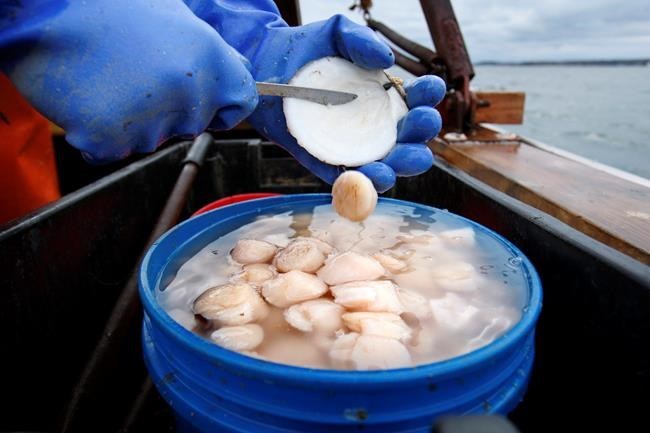
FILE - In this Saturday, Dec. 17, 2011, file photo, scallop meat is shucked at sea off Harpswell, Maine. A disagreement over the right to fish for scallops off New England is pitting small boats against big ones in the scallop-rich northern Gulf of Maine in 2017. Smaller boats are limited in the number of pounds on board, while the largest boats have no such limit but are regulated instead by a limited number of days at sea. (AP Photo/Robert F. Bukaty, File)
Republished February 20, 2017 - 9:19 AM
Original Publication Date February 20, 2017 - 7:10 AM
PORTLAND, Maine - A disagreement over the right to fish for scallops off New England is pitting small boats against big ones in one of the most lucrative fisheries in the U.S.
The federal government maintains different rules for the small- and big-boat scallop fisheries, though they work some of the same areas. Small boat fishermen say the conflict has arisen in the northern Gulf of Maine, a critically important fishing area stretching roughly from Boston to the border of Maine and Canada.
At issue is the fact that the northern Gulf of Maine is fertile ground for scallops right now, and rules allow the bigger boats to harvest more of them. The smaller boats have a possession limit of 200 pounds, while the largest boats have no such limit, because they are regulated instead by a limited number of days at sea.
Smaller boat fishermen said the bigger boats have been gobbling up the scallops in one of the most important areas where they fish.
Without changes, the current arrangement could "wipe out a resource that would sustain a small boat fishery for years and years and years," said Kristan Porter, a small-boat fisherman in the area who sits on a federal scallop advisory panel.
Federal regulators have identified solving the problem as a key goal in the U.S. sea scallop fishery, which has been worth more than $400 million every year since 2010. Scallops are also one of the priciest kinds of seafood that is familiar to many consumers, who often pay more than $20 per pound for them.
Mary Beth Tooley, the chair of a federal scallop committee, also works in government affairs for O'Hara Corp., a major player in the big-boat fishery. The big and small boats can coexist, she said, and regulators will work to make it happen.
"There's a perspective that this is a battle — we need to go to war with these big boats," she said, adding, "I don't think that's necessary."
The scuffle has attracted the attention of Conservation Law Foundation, an environmental advocacy group based in New England. The group is advocating for the playing field to be levelled for both groups of boats, said Peter Shelley, an attorney with the foundation.
"It's an inequity that could be corrected very easily and no one wants to do it," Shelley said. "I just find that to be offensive with a public resource."
The U.S. scallop fishery's most important state is Massachusetts, with New Bedford serving as the home base. They're also brought to shore in other states from Maine to Virginia, with the second-largest amount of shellfish coming ashore in New Jersey.
News from © The Associated Press, 2017